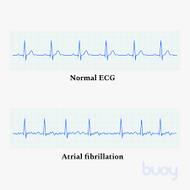Atrial Fibrillation
Posted by DS, DC on May 11th 2022
My goal for this blog is to raise awareness of atrial fibrillation and its variation atrial flutter. I won’t try to give you a complete description as that has been done on an excellent site by Dr. Steve Ryan. The link is at the bottom.
AFib Has Reached Epidemic Levels
Atrial fibrillation has reached epidemic proportions. At least 5 million people in the US have A-Fib and that is expected to grow to 10-16 million in the next 30 years. A-Fib contributes to more than 80,000 deaths annually. Some have estimated that 1 in 8 will develop A-Fib of some variety.
AFib Symptoms Variable
I am bringing this up because not everyone has obvious symptoms. Sometimes the first indication of A-Fib is a serious stroke. The most common symptom of A-Fib is persistent fatigue. This is not a good enough indicator symptom as fatigue is an effect of many disorders. Other things to look for would be some light headedness, shortness of breath, sweating, chest pain, frequent urination. But again, often times a person discovers they have A-Fib of some variety when their smart watch with a heart tracking function suggests that you have an irregular heartbeat. Or maybe you get a good exam by your doctor and you are informed that you have A-Fib.
A-Fib is a big deal for a few reasons whether you have symptoms or not. A-Fib can trigger an increase in heart rate to the point that it becomes life threatening. Even if you don’t die, this is extremely disconcerting and can cause disorientation.
Stroke More Likely With AFib
With A-Fib you are 5-6 times more likely to have a stroke than the general population. Research indicates that untreated A-Fib will lead to a stroke in 35% of patients. Not good numbers. This means that maybe 25% of all strokes are A-Fib related.
A-Fib stroke is not like a TIA or transient ischemic attack where you have a momentary period of symptoms with no permanent damage. An A-Fib stroke is usually serious and disabling if you survive at all. With an A-Fib stroke, 23% die and 44% suffer some serious disability as a result. Other strokes have an 8% death rate.
Heart Health Decreases Over Time
Let’s say that at first you are not in the stroke group of the A-Fib cohort. You should still get treated as persistent A-Fib or atrial flutter will lead to compromise of the heart muscle with an increase in fibrosis or non-contractile heart tissue. Little by little your heart loses more and more of its ability to function as a heart.
Many Smart Devices Can Detect Irregular Heart Rhythms
My recommendation is that you at least monitor your heart with a smart device that can detect arrhythmias. Smart devices most likely won’t diagnose the particular arrhythmia but just report that your heart rhythm isn’t normal. With that finding, a follow-up with your preferred health care professional should follow quickly.
From a personal point of view, I have given up on the Samsung Gear S3. It will give a heart rate but doesn’t seem to check arrhythmias. I also gave up on an older Heal Force monitor. I would get good scans with the three wired electrodes but the computer interface was terrible. I am currently using a Wellue unit. This one is $120 and has a couple of wired leads (much cleaner read than fingertip readers). I have uploaded scans to my PC in a pdf format. You can easily magnify the scans to check the finer points. The Wellue unit is supposed to be able to differentiate some type of arrhythmias but so far mine just reports abnormal rhythm which really is good enough for a home unit.The PC interface gets a B- as it is pretty good but failed on my primary computer but works on a second computer (both HP Windows 10).
Volumes have been written about medical treatment of AFib. I personally had great results with my treatment at St. Helena by Dr. Eisenberg (2020). Shop around to find the best people you can find.
Supplementation Might Help Recovery
Supplementation has been reported to help with A-fib. Your mileage may vary but giving your heart some basic nutrition is reasonable. The a-fib.com link does have a supplement section in the treatment pages. All of these recommendations are consistent with what we know about supporting the heart. I won’t go into detail as each supplement is described on that site. Look for Karuna CoQ-10 100, NuMedica Taurine, Douglas Labs Hawthorne Max-V. We stay in business by your purchases of these and other quality supplements from OVitaminPro.com.
The quick take-away? Know something about your family history. Check your heart rate and rhythm periodically and treat arrhythmias seriously. They are easier to treat the sooner you start. For more information:
